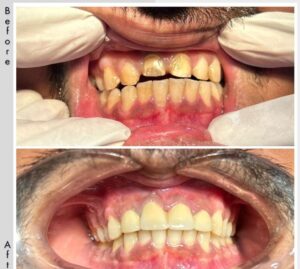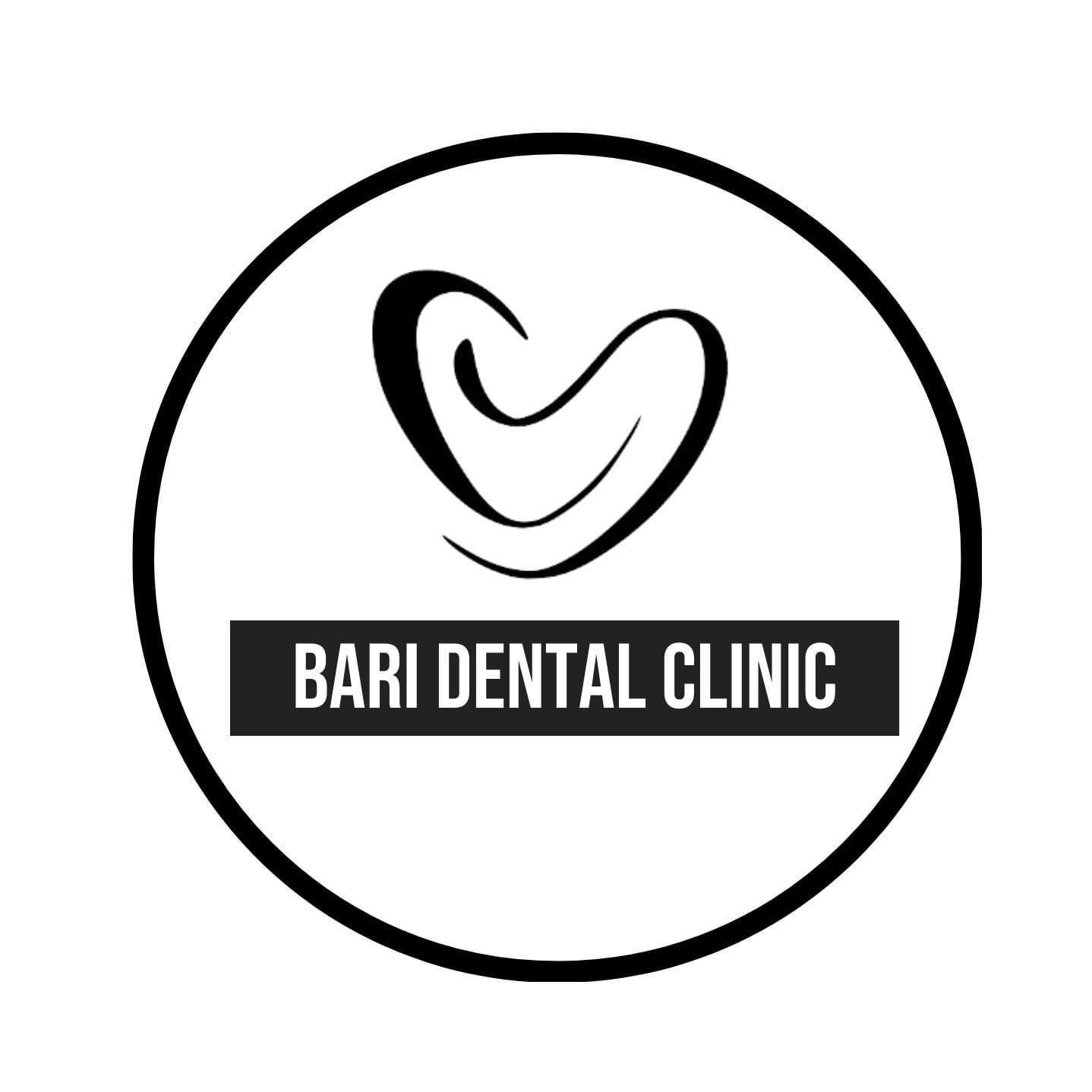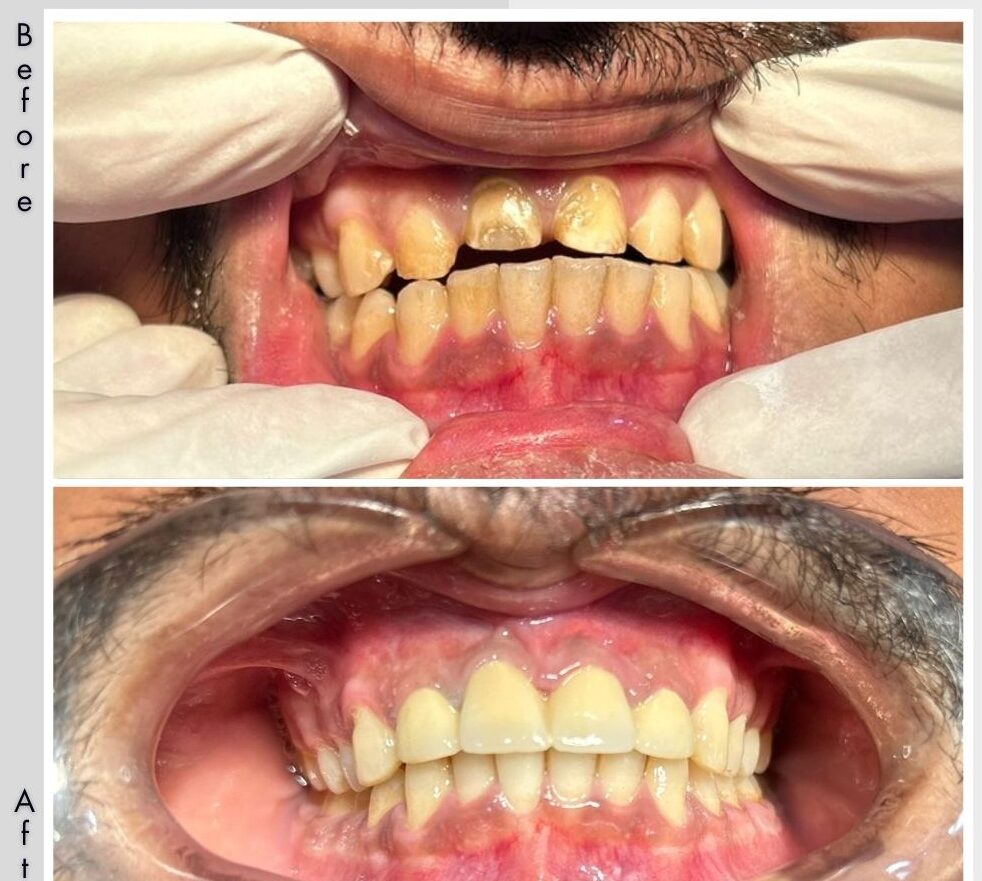Understanding Dental Diseases : Causes, Prevention, and Treatment
Dental disease encompasses a range of oral health problems that can affect your teeth, gums, and overall well-being. From tooth decay to gum disease, these conditions can lead to serious complications if not addressed in time. In this blog, we’ll explore common dental diseases, their causes, prevention tips, and treatment options available at Dr. Ahmed Bari Dental Clinic in Karachi.
Common Types of Dental Disease
- Tooth Decay (Cavities) Tooth decay is one of the most common dental diseases. It occurs when the enamel, the outer layer of the tooth, is broken down by acids produced by bacteria in plaque. These bacteria feed on sugars from the food you eat, forming acids that erode the enamel, leading to cavities.
- Symptoms: Sensitivity to hot, cold, or sweet foods, visible holes or pits in teeth, toothache.
- Prevention: Brush twice a day with fluoride toothpaste, reduce sugary foods and drinks, and floss daily.
- Gum Disease (Periodontal Disease) Gum disease is an infection of the tissues that surround and support your teeth. It begins with gingivitis, which is characterized by inflamed gums that bleed easily. If left untreated, it can progress to periodontitis, where the gums pull away from the teeth, causing bone loss and tooth loss.
- Symptoms: Red, swollen, or bleeding gums, bad breath, loose teeth, receding gums.
- Prevention: Maintain good oral hygiene, get regular dental cleanings, and quit smoking.
- Oral Cancer Oral cancer can affect any part of the mouth, including the tongue, lips, and throat. While it is less common than tooth decay or gum disease, it is a serious condition that requires early detection for effective treatment.
- Symptoms: Persistent sores, lumps, or rough spots in the mouth, difficulty chewing or swallowing, unexplained weight loss.
- Prevention: Avoid tobacco use, limit alcohol consumption, and protect your lips from excessive sun exposure.
- Tooth Sensitivity Tooth sensitivity occurs when the underlying layer of the tooth (dentin) becomes exposed due to enamel erosion or receding gums. This can make teeth sensitive to hot, cold, or sweet stimuli.
- Symptoms: Discomfort or pain when consuming hot, cold, or sweet foods.
- Prevention: Use toothpaste for sensitive teeth, avoid overly acidic foods, and maintain good oral hygiene.
- Tooth Erosion Tooth erosion is the gradual loss of enamel due to acids from food, drinks, or stomach acids. This can lead to tooth sensitivity, discoloration, and increased risk of cavities.
- Symptoms: Sensitivity, discoloration, or cracking of teeth.
- Prevention: Limit acidic foods and drinks, use fluoride toothpaste, and rinse your mouth with water after consuming acidic items.
Causes of Dental Disease
Dental diseases are primarily caused by the buildup of plaque—a sticky film of bacteria that forms on your teeth. Other contributing factors include:
- Poor Oral Hygiene: Inadequate brushing and flossing allow plaque to build up.
- Diet: A diet high in sugars and carbohydrates fuels the bacteria in plaque, leading to cavities and gum disease.
- Smoking: Tobacco use is a major risk factor for gum disease, tooth loss, and oral cancer.
- Dry Mouth: A lack of saliva, which helps neutralize acids and wash away food particles, can increase the risk of tooth decay.
- Genetics: Some people may be more susceptible to dental disease due to their genetic makeup.
How to Prevent Dental Disease
Preventing dental diseases is key to maintaining a healthy mouth. Here are some practical tips:
- Brush and Floss Daily: Brush twice a day for at least two minutes and floss once a day to remove plaque between your teeth.
- Regular Dental Check-ups: Visit your dentist every six months for cleanings and examinations. Early detection of dental disease can prevent more serious problems.
- Limit Sugary Foods and Drinks: Reduce your intake of sugary snacks and beverages that feed harmful bacteria in the mouth.
- Quit Smoking: Smoking increases your risk of gum disease, tooth loss, and oral cancer.
- Use Fluoride: Fluoride strengthens the enamel and helps prevent cavities. Use fluoride toothpaste and consider fluoride treatments from your dentist.
- Eat a Balanced Diet: A diet rich in vitamins and minerals, particularly calcium and vitamin D, supports healthy teeth and gums.

Treatment Options for Dental Disease
At Dr. Ahmed Bari Dental Clinic, we offer a range of treatments to manage and treat dental diseases, including:
- Fillings and Crowns: For cavities and tooth decay, your dentist may recommend fillings to restore the tooth or crowns for more extensive decay.
- Root Canal Treatment: If tooth decay reaches the pulp of the tooth, a root canal may be necessary to save the tooth from extraction.
- Scaling and Root Planing: For gum disease, scaling and root planing remove plaque and tartar from below the gum line and smooth the tooth roots to promote healing.
- Oral Cancer Screening: Early detection of oral cancer through regular screenings can increase the chances of successful treatment.
- Tooth Extractions: In cases where a tooth is beyond repair, extraction may be necessary to prevent the spread of infection.
Conclusion
Dental diseases are preventable and treatable with the right care. By maintaining good oral hygiene and visiting your dentist regularly, you can protect your teeth and gums from damage. At Dr. Ahmed Bari Dental Clinic, we are committed to providing comprehensive dental care to help you achieve a healthy, beautiful smile. Whether you need preventive care, treatment for dental disease, or cosmetic improvements, our experienced team is here to help.
Contact Dr. Ahmed Bari Dental Clinic
Location: Suite numbers 12, 13, & 14, Marhaba Heights, Block M North Nazimabad Town, Karachi, Karachi City, Sindh 74600
Phone: 0333 3435123
Website: https://drbaridentalclinic.com/

